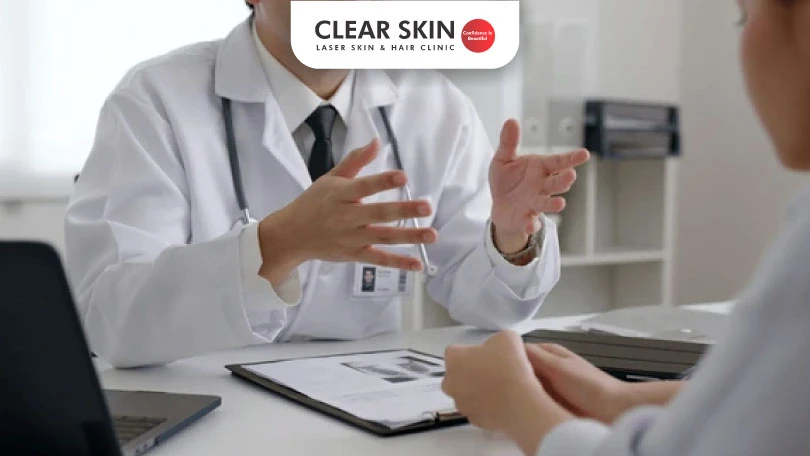Reviewed By:
Category: Other Skin Conditions
Whether it is persistent acne or a stubborn rash that has prompted you to book an appointment with a dermatologist, it is important to prepare for the appointment ahead of time. Your diagnosis and treatment will depend entirely upon what you say when you meet the dermatologist, so it is crucial to present a clear and precise description of the problem.

Before your visit, jot down the list of symptoms including dates, what treatments and creams you’ve used to date, severity, and progression so that you can make effective use of your time with the dermatologist,
Equally important, but often ignored, is the step of preparing a list of questions to ask your dermatologist. Dermatologists themselves recommend asking questions so that they can customize the consultation to your needs and so that vital information is not missed during your appointment.
Table Of Content
- What Questions Should I ask at My Appointment with a Dermatologist?
- What Should I not say at My Dermatologist Appointment?
- Conclusion
What Questions Should I ask at My Appointment with a Dermatologist?
If you have thought ‘I just want is a quick appointment with a dermatologist near me, who can resolve my issue,’ you are not alone. Finding a good dermatologist nearby, and fitting an appointment into your schedule can take up a significant portion of your energy and resources,, leaving you little time to come up with additional questions to ask the doctor.
So here is a handy list you can put to good use when you go to your next dermatologist appointment:
- Ask if you can continue with your usual skin and hair routine while treatment is ongoing.
Maybe you use the latest products on the market or perhaps you rely on good old home remedies. Either way, the products you use may impact the effectiveness of your treatment. Acne skin-care ingredients, for example, can make skin sensitive to the sun. Certain face oils can block pores. Some skin or hair issues result simply from using too many products together. So be sure to check with your doctor whether you can continue to use your usual products during treatment.
- Ask about interactions with any medications you may already be taking.
If you are using any natural remedies or are taking vitamin or herbal supplements, make your dermatologist aware of these. Certain medication interactions may cause or exacerbate skin issues. It is best to have the doctor evaluate their potential impact on your skin. In addition, discuss your lifestyle, wedding plans, etc. if any.
- Ask any questions you may have based on family /medical history.
Whether it is hereditary baldness or eczema that runs in the family, ask how that might impact you and how it might be addressed.
- Don’t be shy to ask questions unrelated to your immediate problem.
For example, if you have been looking for the best moisturizer for your skin type or debating how often you should exfoliate, the perfect time to get answers is when you are at your appointment with the dermatologist! The doctors will prescribe the best-suited products based on your skin type.
- Ask about follow-up appointments.
Finding the perfect regimen for your skin can sometimes be tricky and can involve multiple visits. Ask the front office about online consultation options for your future dermatologist appointments. Ensure you attend all the follow-up appointments.
What Should I not say at My Dermatologist Appointment?
No question is too trivial when it comes to your skin. However, there is one big no-no – avoid questioning your doctor based on knowledge gathered from the internet!
Preparing and asking the right questions can assure you of clarity and comfort in your treatment plan. With the right questions, you can get the most out of your appointment with a dermatologist and be on your way to healthy, happy skin and hair!
Conclusion
Popular Q&As
Why are my lips dark?
Dark lips can be caused by sun exposure, dehydration, smoking, or lifestyle factors. Understand the reasons and find expert solutions at Clear Skin Clinic, Pune.
How to Reduce Melanin Production in Skin Naturally?
Diet plays a good role to decrease melanin in your body.
How to Remove Black Scars on legs?
If you’re dealing with black scars on your legs, it’s likely due to conditions like folliculitis caused by ingrown hairs from waxing. Laser hair removal offers a permanent solution by destroying hair follicles, reducing future ingrown hairs.
We Got Your Back! Ask Us Anything On Your Mind!
Reach out to us on
Didn’t Find What You Were Looking?
Please Contact Us.
We are committed not only to treating you, but also educating you.

